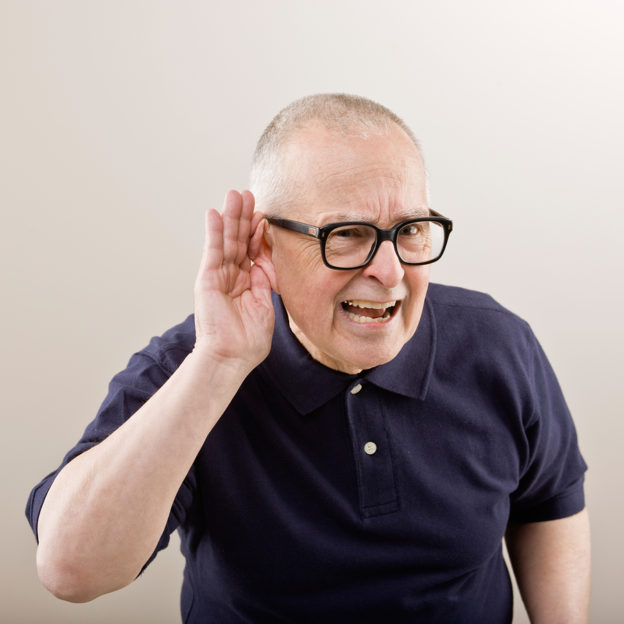By David Blyweiss, M.D., Advanced Natural Wellness
January 13, 2017
- Hearing loss affects people of all ages
- When it comes to your hearing, nutrition is everything
- What about that ringing in your ears?
You might think you’re too young to be concerned about hearing loss. But that’s just wishful thinking. Hearing loss can start at any age.
In fact, here in the U.S., almost 28 million people between the ages of 20 and 69 have some form of hearing loss. And men in these age ranges are twice more likely than women to develop hearing problems.
There are many things other than age that contribute to hearing loss. Exposure to loud noises, of course, is a big one. If you’re diabetic or anemic you’re also at greater risk. Smoking and alcohol use contribute to hearing loss, too.
Then, there are the medications you take.
For example, nonsteroidal anti-inflammatory drugs (NSAIDs) increase the chance of hearing loss by 61% in men who are younger than 50. Acetaminophen nearly doubles the likelihood, and regular aspirin use increases the risk by about a third.
Statin drug users tend to have lower hearing scores than people who don’t use them. Aminoglycoside antibiotics, like streptomycin, gentamicin and neomycin, can all cause hearing loss and ringing in the ears. Erectile function medications (sildenafil, vardenafil) can cause you to suddenly lose your hearing.
When you take all of this into consideration, no one is immune to hearing loss. And the more exposure you have to these risk factors, the greater your chances of developing hearing problems at some point in the near future.
Open your arteries, improve blood flow for a new health miracle...
Did you know your circulatory system has over 60,000 miles of arteries, veins and other blood vessels, if stretched end to end?
But as you age, your blood vessels undergo changes, which may cause them to stiffen, thicken and get clogged.
GOOD NEWS! Doctors have now identified a “Miracle Molecule” inside your arteries that helps OPEN your arteries and IMPROVE blood flow.
It’s what Dr. Valentin Fuster calls it, "One of the most important discoveries in the history of cardiovascular medicine."To you, that means...
- Healthy blood pressure
- Sharper mind and memory
- Skyrocketing energy and muscular strength
- Increased pleasure and passion in the bedroom
- Improved circulation to every cell and organ in your body
Go here to discover a new natural way to significantly boost the levels of this miracle molecule in YOUR body NOW!
Or, you may already be asking people to repeat themselves more often than you would like.
Either way, it’s time to start taking precautions against hearing loss.
When it Comes to Your Hearing, Nutrition is Everything
Vitamin A isn’t one of those superstar nutrients that regularly appear in headline news. In fact, most people don’t even talk about it anymore. However, it’s absolutely necessary to keep your immune system working properly and preserving your eyesight. It also helps your organs – your heart, lungs, kidneys and all of the rest of them – work properly.
Well, it also protects against hearing loss. In fact, people who get the most vitamin A either through diet or supplementation are able to cut their risk of hearing loss by almost 50%.
It’s not hard to get vitamin A in your diet. Sweet potatoes, carrots, greens, cantaloupe, mangoes and red peppers are all high in this nutrient.
Vitamin B12 deficiency is a real problem here in the U.S. It’s something we’re just not getting enough of. And it could be affecting your hearing.
First, there there’s evidence that vitamin B12 deficiency is associated with cochlear dysfunction. The cochlea is the tiny snail-shaped organ that’s necessary for hearing. If it’s not functioning properly, you’ll experience hearing loss.
The World's Quickest Solution for Ending Prostate and Urinary Misery
This has recently been revealed to be one of the only real breakthroughs in prostate health.
The seeds of a strange fruit (sometimes called "Chinese Apples") hold powerful phytonutrients that are a revolution in prostate health.
In fact, UCLA and Veterans Administration research have now proved this to be true.
Not only that, but it may be the worlds quickest solution for ending prostate misery.
Simply stated, these phytonutrients represent a huge step beyond beta sitosterol, saw palmetto, and other phytosterols alone.
Simply click HERE if you want to have fast prostate relief...restful, uninterrupted sleep...no more constant "urges to go"...enhanced virility...and optimal prostate support for life.
Second, people with the highest intakes of both vitamin A and vitamin B12 tend to hear better than those with lower intakes.
Third, about two out of every five people with tinnitus are deficient in vitamin B12. However, supplementation can significantly improve the symptoms.
Your best source of B12 is seafood. Wild caught sardines, salmon, scallops, shrimp and lobster are all high in this B vitamin. Grassfed lamb and beef liver are other good sources.
But B12 isn’t the only thing you’ll get when you eat seafood. You’ll also fuel your hearing with plenty of omega-3 fatty acids. As a matter of fact, people who eat two more servings of fish a week drastically cut their risk of hearing loss… by as much as 42%.
What about that Ringing in Your Ears?
Unless you get frequent colds, you probably don’t think much about zinc. But just like vitamin A, it’s essential to number of functions within your body. The interesting thing about zinc, though, is that your body can’t store it. This means you have to constantly fuel your body with it through your diet.
When it comes to your hearing, zinc is noted for its ability to slash symptoms of tinnitus. (That’s what it’s called when you get that weird ringing or buzzing sound in your ears.) It works so well that more than 80% of patients who take it report a decrease in symptoms.
Cooked oysters are one of the foods highest in zinc. Crab and lobster also have an appreciable zinc content. But if you’re not a seafood lover, don’t worry. You can also get more zinc into your body by eating grassfed beef or lamb, sesame seeds, pumpkin seeds and lentils.
If you’re having a hard time getting enough of these nutrients in your diet, supplementing daily with a multi-vitamin and a high quality omega-3 fish oil formula can provide added protection.
Don’t take your hearing for granted. Out of all your five senses, it’s second only to vision loss when it comes to importance.
SOURCES:
Curhan SG, et al. Analgesic Use and the Risk of Hearing Loss in Men. Am J Med. 2010 Mar; 123(3): 231–237.
Nash, Scott D., MS, et al, The Prevalence of Hearing Impairment and Associated Risk Factors. Arch. Otolaryngol Head Neck Surg. Feb. 21, 2011
Huth ME, et al. Mechanisms of aminoglycoside ototoxicity and targets of hair cell protection. Int J Otolaryngol. 2011;2011:937861.
Maddox PT, et al. Sudden hearing loss from PDE-5 inhibitors: A possible cellular stress etiology. Laryngoscope. 2009 Aug;119(8):1586-9.
Gopinath B, et al. Dietary antioxidant intake is associated with the prevalence but not incidence of age-related hearing loss. J Nutr Health Aging. 2011 Dec;15(10):896-900.
Karli R, et al. Effect of vitamin B12 deficiency on otoacoustic emissions. Acta Otorhinolaryngol Ital. 2013 Aug; 33(4): 243–247.
Péneau S, et al. Intake of specific nutrients and foods and hearing level measured 13 years later. Br J Nutr. 2013 Jun;109(11):2079-88.
Singh C, et al. Therapeutic role of Vitamin B12 in patients of chronic tinnitus: A pilot study. Noise Health. 2016 Mar-Apr;18(81):93-7.
Gopinath B, et al. Consumption of omega-3 fatty acids and fish and risk of age-related hearing loss. Am J Clin Nutr. 2010 Aug;92(2):416-21.
Arda HN, et al. The role of zinc in the treatment of tinnitus. Otol Neurotol. 2003 Jan;24(1):86-9.
Ochi K, et al Zinc deficiency and tinnitus. Auris Nasus Larynx. 2003 Feb;30 Suppl:S25-8.







